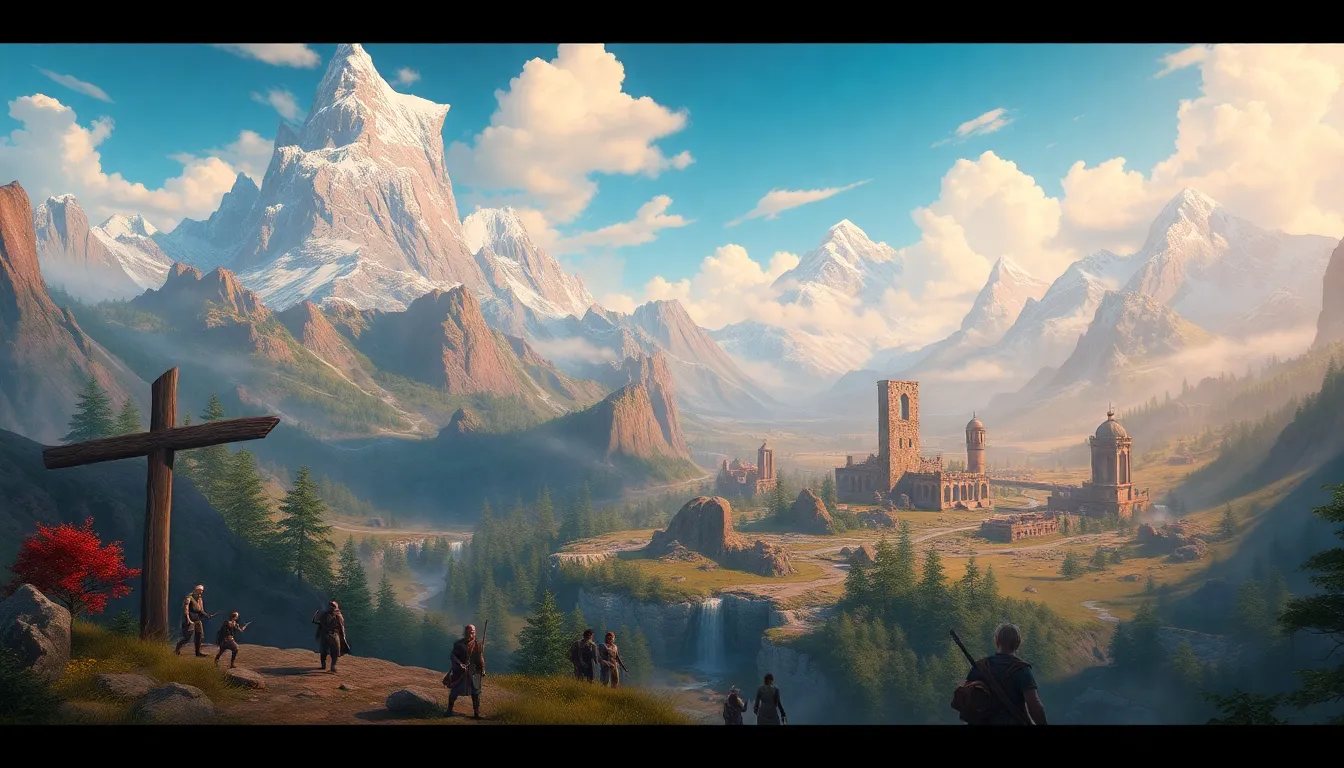Open world PC titles are like the ultimate playgrounds for gamers, offering vast landscapes teeming with adventures. Imagine roaming through lush forests, scaling towering mountains, or exploring bustling cities—all at your own pace. These games let players craft their own stories, break the rules, and embrace chaos, whether they’re saving the world or just causing a little mischief.
Table of Contents
ToggleOverview of Open World PC Titles
Open world PC titles offer extensive, immersive environments that encourage exploration. Players often find themselves wandering through varied landscapes like dense forests, towering mountains, and bustling urban centers. Gameplay emphasizes freedom and individuality, enabling users to approach challenges in unique ways.
Game design prioritizes player agency, allowing choices to shape the narrative. Each decision can lead to different outcomes, fostering personal investment in the storyline. Characters within these titles often exhibit depth, with players forming connections through shared experiences or conflicts.
Many developers focus on creating lifelike ecosystems where players interact with wildlife and non-playable characters. These interactions add layers to the gaming experience, enhancing realism and immersion. Rich visual details and dynamic weather systems further enrich the player’s journey.
Popular examples of open world PC titles include “The Elder Scrolls V: Skyrim,” which features a vast, intricately designed world filled with quests. “Grand Theft Auto V” expands on that concept by providing a modern urban environment teeming with activities. “The Witcher 3: Wild Hunt” presents a richly woven narrative set in a visually stunning fantasy realm.
Advancements in technology continue to elevate the open world genre. New graphics engines and artificial intelligence create more engaging and responsive environments. As developers push boundaries, the gaming community seeks ever more expansive and intricate worlds to explore.
Players frequently discuss their experiences, sharing tips on navigating complex terrains or uncovering hidden secrets. This collaborative spirit among gamers enhances the enjoyment and longevity of open world titles. Engaging with a community adds a social dimension to the adventures, enriching the overall experience.
Popular Open World PC Titles

Open world PC titles captivate gamers with expansive environments and rich storytelling. Notable examples showcase the genre’s versatility and appeal.
The Elder Scrolls V: Skyrim
“The Elder Scrolls V: Skyrim” offers an expansive fantasy world filled with dragons, ancient ruins, and countless quest options. Players explore the diverse regions of Skyrim, from snowy mountains to lush forests. Character customization allows for unique playstyles, whether a stealthy assassin or a powerful sorcerer. Immersive lore and dynamic factions enhance the experience by providing depth and replayability. Players’ choices influence the game’s outcome, allowing for varied storylines. Its modding community keeps the game alive, introducing new content and experiences, further solidifying its status as a classic.
Grand Theft Auto V
“Grand Theft Auto V” immerses players in the sprawling city of Los Santos, a vibrant setting filled with activities and characters. The game’s narrative intertwines the lives of three protagonists, each with distinct abilities and story arcs. Players can engage in high-speed chases, explore the vast open world, or participate in random events. A variety of vehicles and weapons enhance gameplay while dynamic online modes foster community engagement. The rich detail in Los Santos, combined with the immersive soundtrack, creates an unforgettable experience that continues to attract audiences worldwide.
The Witcher 3: Wild Hunt
“The Witcher 3: Wild Hunt” presents a breathtaking world that blends fantasy with deep storytelling. Players take on the role of Geralt of Rivia, a monster hunter tasked with locating his adopted daughter. Expansive environments encourage exploration, from the bustling cities to serene countryside. Side quests often rival the main storyline in depth and complexity, enabling immersive experiences. A strong emphasis on choice and consequence allows players’ decisions to impact the narrative and world significantly. With exceptional character development and stunning graphics, this title remains a benchmark in open world gaming.
Key Features of Open World Games
Open world games create expansive experiences filled with exploration and discovery. They offer players the ability to roam freely through diverse landscapes and create their own stories.
Exploration and Freedom
Exploration plays a crucial role in enhancing player engagement. Players can traverse mountains, forests, and urban settings at their chosen pace. Freedom is evident in the ability to undertake quests or simply enjoy the scenery. Choices made during exploration impact the narrative, allowing for unique experiences. Furthermore, hidden treasures and secrets encourage discovery. Ultimately, this design fosters a sense of adventure and immersion, making the world feel alive.
Dynamic Environments
Dynamic environments significantly enhance realism. Various ecosystems boast interactive wildlife, weather patterns, and non-playable characters that react to player actions. Changing seasons can alter landscapes and gameplay. Furthermore, engaging visuals and sound design contribute to immersion. Events in the game world can unfold in response to players’ decisions or actions, leading to varied outcomes. This dynamic nature keeps gameplay fresh, ensuring that players remain invested in the experience. Overall, dynamic environments enrich the open world, creating a living world that thrives with possibilities.
Challenges in Open World Design
Open world game design poses unique challenges that developers must navigate to create engaging experiences. The complexity of crafting these expansive worlds requires careful consideration of multiple factors.
Balancing Gameplay
Gameplay balance emerges as a crucial aspect in open world titles. Developers strive to ensure that challenges remain engaging without overwhelming players. Integrating varied quests and activities keeps players intrigued, providing opportunities for exploration and character development. A well-balanced system encourages players to pursue both main and side quests, maintaining interest throughout the game. By offering diverse gameplay mechanics, developers can address different player styles, making the experience enjoyable for a wide audience.
Technical Limitations
Technical limitations significantly impact open world game design. Resource management becomes critical, as large, detailed environments demand considerable memory and processing power. Optimizing graphics without sacrificing performance is essential for player satisfaction. Moreover, AI complexity poses unique challenges; sophisticated non-playable characters require efficient algorithms to react responsively to player actions. These considerations can influence the overall design, prioritizing smooth gameplay while creating immersive environments.
Future Trends in Open World Gaming
Emerging technologies are shaping the future of open world gaming. Increased focus on virtual reality (VR) and augmented reality (AR) creates opportunities for more immersive player experiences. Players might find themselves interacting with game environments in revolutionary ways, enhancing engagement.
Artificial intelligence advancements are set to make non-playable characters (NPCs) more responsive and lifelike. Dynamic dialogues could lead to richer interactions, allowing players to experience consequences based on their choices. Game worlds might feel more alive, reacting to player actions in unexpected ways.
Procedural generation is transforming how developers create expansive landscapes. This technique can produce vast, unique environments without requiring extensive manual design. Gamers benefit from fresh experiences each time they explore, ensuring long-term replayability.
Cross-platform play continues gaining traction. Open world titles allowing players on different devices to interact strengthens communities. Gamers can share experiences, strategies, and discoveries seamlessly, enhancing the social aspect of gaming.
Incorporating user-generated content becomes increasingly vital. Allowing players to modify and expand game worlds can lead to richer narratives and experiences. Support for mods fosters community creativity, prolonging game longevity.
Sustainability is becoming a key theme among developers. Many are focusing on creating eco-friendly gaming practices, reducing environmental impact. This conscientious approach resonates with players, who value sustainability as part of their gaming experience.
As these trends evolve, players can anticipate exciting innovations in open world titles. Each trend aims to enhance immersion, foster engagement, and expand possibilities, ensuring open world gaming continues to thrive and captivate audiences.
Open world PC titles offer a unique blend of freedom and immersion that captivates gamers. The ability to explore vast landscapes and shape personal narratives creates a deeply engaging experience. As technology advances the genre continues to evolve, promising even more lifelike interactions and dynamic environments.
Players can look forward to innovations that enhance gameplay and foster community engagement. With a focus on sustainability and user-generated content, the future of open world gaming is bright. These elements not only enrich the gaming experience but also invite players to actively participate in the worlds they inhabit. The journey through these expansive playgrounds is just beginning, and the possibilities are limitless.




